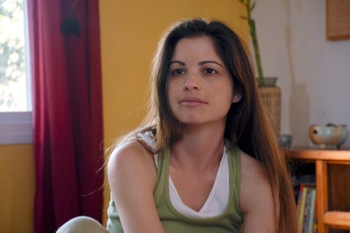Our story follows Jeb Berrier, an average American guy who is admittedly not a “tree hugger,” who makes a pledge to stop using plastic bags. His girlfriend, Anne, joins him in the challenge to decrease their use of plastic at home. This small action gets Jeb thinking about plastic—not just about plastic bags, but other kinds of plastic. “What is plastic made of? Is it recyclable? Does it decompose when it ends up in the landfill? Does plastic have negative health effects?” Jeb wants to learn more, so he embarks on a global tour to unravel the complexities of our plastic world.
Jeb begins his journey by delving into the history of the plastic bag and how they have become a ubiquitous part of our daily lives. Only 50 years ago, plastic bags did not exist! Jeb travels around the world to find better possible models. In Ireland he finds that a fee on plastic bags has had a tremendous positive impact on plastic bag reduction—over 90%. He ventures to communities in the U.S. that have implemented or proposed plastic bag bans and fees, and we learn of the complicated politics surrounding the issue. He discovers that the American Chemistry Council (the ACC) has been leveraging big money to keep plastic bag use free.
Plastic bags then lead Jeb into the world of ‘single-use disposable’ plastic. Jeb goes into a well-known coffee chain and is incensed to see everyone sitting inside using to-go cups. Jeb alludes to our ‘culture of convenience’—we want everything now and FAST! Most people don’t even think about the massive amount of plastic wrappers, food containers, bottles and packaging materials that make up an average American’s plastic waste per year—800 lbs!!
Upon thinking about this massive amount of waste from only single use disposables, Jeb then begins to consider the rest of our waste. What really happens to items that have the “chasing arrows” recycling symbol on them? Do they all really get recycled? What do the numbers mean? Jeb does quite a bit of research on the matter and still finds himself confused. Turns’ out, recycling is very confusing, and BAG IT attempts to get to the bottom of this.
In an intimate moment in front of the camera, Jeb tells us that he and Anne are going to have a baby! The story of Jeb and Anne about to have a baby gives the movie a dramatic twist, as the story becomes very intimate. We watch our protagonists go through all of the excitement, nervousness, planning, and joy that comes with having their first child. We listen intently as Anne and Jeb describe their feelings about plastic as is relates to their unborn child. Everything takes on new meaning when the world you are living in will be what you are creating for your child.
BAG IT explores the impact of plastic on marine life. Plastic never fully degrades, and when it is thrown “away,” some of it finds its way into our waterways, and eventually, our oceans. Plastic breaks down into smaller and smaller pieces, and marine animals are ingesting these bits of plastic … and it’s killing them. It is estimated that over a hundred thousands birds and marine animals die each year from ingesting, or getting entangled in, plastic debris. Jeb learns that the chemicals in plastics are making their way up the food chain and straight onto our dinner plates.
If plastic is making its way into the food we eat, in what other ways might plastic be impacting our health? Again, this hits close to home. We discover that to make plastics hard or soft, chemicals must be added. Chemicals such as Bisphenol-A, (BPA) and phthalates are added during manufacturing. Scientists have overwhelming evidence that these and other chemicals are affecting humans—specifically babies in utero and children. BPA and phthalates are linked to numerous health problems—cancer, diabetes, autism, attention deficit disorder, obesity, infertility—even smaller penis size. These chemicals are also found in personal care products and cosmetics, something not many people know, and leach into our bodies through our skin. Jeb asks, who is protecting us? Do corporations care about their consumers, or just about their profits?
While BAG IT is a film that deals with a serious subject, the film’s tone and mood is kept light to keep audiences engaged and entertained. BAG IT will draw in a broad range of people to the film, not just environmentalists. While many environmental films leave viewers disheartened and feeling helpless, BAG IT will leave viewers feeling empowered, informed, and excited to create change starting today!



